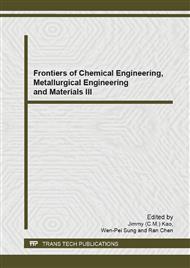p.699
p.703
p.713
p.717
p.721
p.728
p.732
p.736
p.740
Comprehensive Evaluation Method of ORC System Performance Based on the Multi-Objective Optimization
Abstract:
The choice of evaluating indicator has a most important influence on the performance analysis and optimization of Organic Rankine-cycle (ORC) system. In this paper, the net output power of unit mass of exhaust gas (), the cycle exergy efficiency (), the total waste heat emissions () and the product of exchanger's area and total heat transfer coefficient () are selected as the four key indicators which can reflect the characteristics of ORC system. And then, a comprehensive evaluating indicator of ORC system performance () is obtained according to the theory of multi-objective optimization. Further, a comprehensive evaluation method of ORC system performance based on the multi-objective optimization is put forward in this paper. After that, this method is used to optimize the evaporation temperature which is considered as a key parameter of ORC system performance. According to researches, the results gained by using a single-objective optimization method with only one performance parameter as the indicator, cannot often take a global view of the ORC system performance and sometimes may lead to a deviation. Researches also show that increases firstly and then decreases with the increment of the evaporation temperature, and there exists a value of evaporation temperature to maximize . Through analysis and researches, it can be found that the comprehensive evaluation method of ORC system performance based on the multi-objective optimization provided in this paper gives a synthetic consideration to the requirements from high-efficiency, economy, thermodynamic perfection and environment protection. Moreover, by using this method, the ORC power generation system may be more likely to achieve the best comprehensive performance.
Info:
Periodical:
Pages:
721-727
DOI:
Citation:
Online since:
August 2014
Authors:
Price:
Сopyright:
© 2014 Trans Tech Publications Ltd. All Rights Reserved
Share:
Citation:


